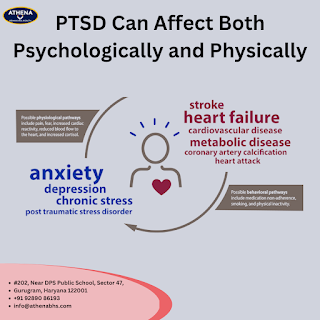PTSD stands for Posttraumatic Stress Disorder and is a common mental health condition, and is also referred to as “shell shock” or “combat fatigue”. However, PTSD is not just limited to veterans of the war and occurs to people anywhere across the globe who have faced or witnessed a traumatic event.
The psychological symptoms of PTSD are more known such as nightmares. However, PTSD also manifests physically and can cause symptoms like nausea and chronic pain. This article covers everything you need to know about the psychological and physical symptoms of PTSD. Read on!
What is PTSD?
PTSD is a prevalent mental health illness that can develop as a result of trauma. Trauma is any terrifying or upsetting incident that makes you feel as though your safety or the safety of others is in danger. Trauma may be anything that occurs to you or to someone you know. It can also include anything you see in the news, on the internet, or in your town.
It is
important to know that PTSD is not a sign of weakness and it’s a genuine mental
health condition that can be treated. You or a loved one can start to feel
better with the assistance of a mental health expert.
Common psychological symptoms of PTSD
The following are the most common psychological symptoms of PTSD:
Re-experiencing the event: People suffering from PTSD continuously experience the incident through their thoughts and recollections of the trauma. These could consist of nightmares, hallucinations, and at times flashbacks. When specific things, such as the date of the incident, trigger strong memories of the trauma, they may also experience severe discomfort.
Heightened Arousal: This entails excessive emotions, issues with interpersonal relationships, such as having trouble experiencing or expressing affection, sleep issues, irritability, explosive rage, difficulties focusing, and being "jumpy" or quickly startled.
Avoidance: To prevent being reminded of the trauma, the individual may avoid certain persons, places, things, or circumstances. This could culminate in the person feeling distant and alone from their loved ones, as well as losing interest in past activities which they liked.
Negative Mood: This entails pessimistic views about yourself, other individuals or the world, feelings of hopelessness about the future, feeling numb, difficulties in feeling positive emotions, and certain memory problems.
Common physical symptoms of PTSD
In addition to the psychological symptoms, patients may also experience physical symptoms which include:
●
Muscle tension
●
Joint pain
●
Headaches
●
Fast heartbeat
●
Fatigue
●
Nausea
●
Back pain
Physical symptoms of PTSD are more prevalent in people who also have other mental health disorders like depression or anxiety.
What is the link between trauma and physical health problems?
Although scientists do not fully understand why trauma creates physical issues, we do know that the human body responds physically to a threat. The term "fight-or-flight" response is used to describe this physiological response.
When your body is in "fight-or-flight" mode, chemicals and hormones are released that "prepare" your body to react to a threatening circumstance by either fighting or fleeing.
Your body
uses the fight-or-flight reaction to defend itself. However, a constant state
of fight-or-flight can be unhealthy for your bodily systems and lead to health
issues. This could be the cause of the link between PTSD and other medical
disorders.
Risk Factors and Causes of PTSD
Everyone responds differently to distressing events. The ability to manage stress, anxiety and the threat posed by a traumatic event or condition varies from person to person. As a result, not every person who suffers trauma develops PTSD. After a traumatic event, a person's propensity to acquire PTSD or the severity of their symptoms may be influenced by the level of care and support they receive from their immediate support system.
Risk Factors which heighten the chance of developing PTSD are:
● Traumatising past events,
such as child abuse
● Working in a profession
that puts you at an increased risk of experiencing trauma (such as military
personnel or first responders)
● Having issues with drug
misuse
● Lacking a reliable social
support system
Way Forward
Traumatic
experiences can sometimes leave people with overpowering thoughts and feelings
that impair their capacity to function. In other instances, harmful behaviours
that at first served to reduce the symptoms of trauma develop into dangerous
routines. There are new therapies out there that can help trauma survivors and
their families. Conventional therapy can also aid in bridging the gap between
suffering and development.
Athena Behavioral Health is a leading Mental Health Rehabilitation Centre. Our skilled doctors provide thorough treatment plans that are individualised for each patient and include cutting-edge, traditional, and holistic therapies. As the best Mental Rehabilitation Centre in India, our programmes offer expert treatment and care to promote healthy acclimatisation to life's events. Our continual continuing care programme offers patients the assistance they need to be symptom-free and experience long-lasting healing. You can WhatsApp us at 9289086193 to learn more about our specialised PTSD treatment programmes.





No comments:
Post a Comment
If you have any doughts. Please let me know